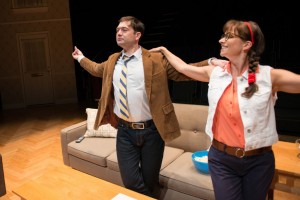Linguistic Marriage Counseling and Character Acting in a Comic Soufflé: THE FULL CATASTROPHE at Contemporary American Theater Festival
Theater Reviews Page | Previous Theater Review | Next Theater Review
Linguistic Marriage Counseling and Character Acting in a Comic Soufflé: THE FULL CATASTROPHE at Contemporary American Theater Festival
Posted on BroadwayWorld.com July 20, 2015
For a weightless and elegant good time, it would be hard to beat The Full Catastrophe, by Michael Weller, based on a novel by David Carkeet, now in production at the Contemporary American Theater Festival in Shepherdstown, WV. There is not one thing in the story to tether it to reality, or trouble us with any true sense of its characters being in any kind of jeopardy, and the presentation of the whole farrago, under Ed Herendeen’s direction, is smooth and amiable.
Imagine marriage counseling being conducted by a multinational corporation under the guidance of an eccentric multimillionaire whose technique is to embed a linguist in the home of the distressed family, who is under strict instructions to open an envelope a day and follow the directions written there. The linguist is something of a refugee from a promising relationship with a graduate student who happens to bear a striking relationship to the wife in the marriage (both portrayed by the versatile Helen Anker), so placing him in the marital household is a case of out of the frying pan into the fire for him.
Identifying the problems in either relationship is not challenging in this fantasy world. Instead, Weller resorts to a convenient comic conceit, ascribed to the eccentric billionaire, that at the heart of every marriage is something generically described as “the Horror.” This seems to be defined as “A fear that one’s love isn’t strong enough to weather a true crisis.” Perhaps to a commitment-phobic character like Jeremy the linguist (Tom Coiner), and even to the couple in whose lives Jeremy is intervening, that might prove true, notwithstanding the considerably larger variety of horrors at the heart of some marriages – and the absence of any horror at the heart of others – in real life. Setting aside the billionaire’s intentionally tendentious theory, in dramatic terms the actual problem with the couple, Beth and Dan (Helen Anker again and Cary Donaldson), seems to be nothing more than seven-year itch-style restlessness and garden-variety anomie. Drop a stranger into a situation like that, and the dramatic issue is more likely to be (and in this case is) the extent to which the inevitable attraction between the stranger and the wife does or does not upset the apple cart.
As already stated, this is a comedy, so it gives away little to say that the apple cart survives the challenge still upright. Likewise, it’s a safe bet that Jeremy will develop some insight that will enable him to rekindle something with the graduate student, perhaps with a nudge from the deus ex machina plutocrat. The point of this exercise is not where it ends up but how it gets there, not the destination but the journey.
This particular journey is marked throughout by funny and appealing character acting, starting with Robbie, the couple’s 10-year-old son (young scene-stealer Sam Shunney), a preternaturally sophisticated youngster who is often several steps ahead of his elders in grasping the obvious. To these should be added Roy Pillow, the eccentric plutocrat, a barker-out of gnomic pronouncements that are sometimes on target, but sometimes more than a little ridiculous (Lee Sellars), and “Everyone Else” – all members of this sizeable ensemble being exclusively portrayed by T. Ryder Smith, a posse of character actors in one. We see him as an executive secretary, a barroom floozy, a clueless sports fan, an understanding bartender, and a waiter. (Combined with his multiple impersonations in WE ARE PUSSY RIOT, playing in repertory with The Full Catastrophe, he proves himself a true paragon of his craft.) These vivid character sketches help the time pass so enjoyably we are apt to ignore how little substance and how much air there is in this soufflé.
As a soufflé, and a dessert soufflé at that, this play is best consumed at the end of one’s visit to this year’s Festival, after sampling the weightier and more nutritional fare. It is a fine way to see this year’s strong Festival out. (Ending with a preposition, a practice which Jeremy the linguist approves of.)
Copyright (c) Jack L. B. Gohn, except for production photo. Photo credit: Seth Freeman.
Theater Reviews Page | Previous Theater Review | Next Theater Review
